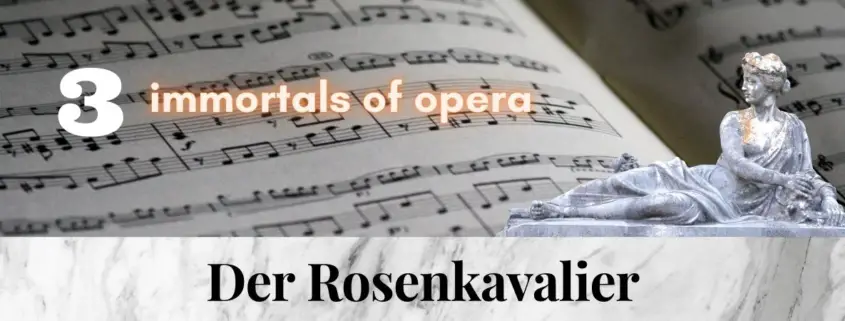3 immortal pieces from the opera DER ROSENKAVALIER by Strauss- with the best interpretations from YouTube (Hits, Best of)
Der Rosenkavalier offers the music lover two of the most sublime scenes in all of opera literature. The handing over of the silver rose and the final sestet are worthy of mention. Like Mozart, Strauss was a composer for female voices, and with this opera he created three immortal roles for sopranos: the Marschallin, Sophie and Octavian. The three different female leads were often played by the same singers throughout their careers: Octavian and Sophie in young and middle years, the Marschallin in more mature years.
Time is a strange thing
This famous piece is a slow dance music that appears in the somber dress of the minor. This contrast of the cheerful rhythm and the gloomy mood is the charm of this piece.
It is the depth of the role of the Marschallin that gives Rosenkavalier the profundity that elevates it above aristocratic role farce. The Marschallin is an “alter ego” of the Countess from Mozart’s Marriage of Figaro; one almost thought the Countess had reawakened.
Elisabeth Schwarzkopf is often mentioned as the Marschallin (and no coincidence also as the Countess). No other singer has embodied this role as she has. Her interpretation of the Marschallin is introverted, yet sensual. Each of her notes seems to be deliberately set (which earned her the accusation of “artificiality”). Music producer and spouse Walter Legge urged her it was better to perfect a handful of operas than to always have a better competitor in dozens. “Schwarzkopf had prepared the role for years with Walter Legge and rehearsed for the Scala premiere with Herbert von Karajan every day for a month, “often ten or twelve hours a day”. (Kesting, Great Singers).
At her stage farewell in 1971, it was no coincidence that she sang this nostalgic monologue in her last program. We hear this section from the “legendary” 1959 recording by Herbert von Karajan, which became the reference recording for many.
Die Zeit ist ein sonderbar Ding – Schwarzkopf
The presentation of the rose – the rapturous love duet
Solemnly, Octavian announces the Baron’s wish to marry and presents the silver-plated rose. As Sophie smells the perfumed rose, their eyes meet and they feel electrified by the sudden love at first sight.
The music reaches a climax as the Rosenkavalier enters. Accompanied by heavenly strings and a beautiful melody in the clarinet, the Rosenkavalier announces his message. The music raptures as Sophie smells the rose Octavian has perfumed with Persian rose oil and their eyes meet. A magnificent love duet unfolds as bliss takes hold of them both.
This scene is among the greatest operatic literature has to offer. Strauss makes harps, celesta and first violins sound intoxicating. He is at the height of mastery of tone painting; one can literally feel the feelings of love and almost smell the scent of rose oil.
We hear the excerpt from a legendary Carlos Kleiber recording. No opera had the peculiar Kleiber conducted more than the Rosenkavalier, (whose first valid recording was by Kleiber’s father Erich). Carlos, however, refused to go into the recording studio, so the recordings were made from a later released television recording (1972) or from a video production. We listen to the production from 1979. Brigitte
We hear the Octavian of Brigitte Fassbaender, a great Octavian performer and she became perhaps her most famous role. Her voice has a rich, velvety-smooth sound. Her partner in this scene was Lucia Popp. Dreamlike how she scales the high D (2:30) and Fassbaender melts away next to it (look at her look).
Mir ist die Ehre widerfahren – Fassbaender / Popp
The ecstatic final trio
The comedy turns into the drama of the Marschallin, whose pain of parting from her youth and love grips the listener and contrasts with the vibrant love of Octavian and Sophie. Soon after, the Marschallin falls silent and the tercet becomes a duet.
This scene is one of the greatest tercets in opera literature. Heavenly singing, farewell and pain, combined with the trembling love of Octavian and Sophie bring forth great emotion.
For many, Carlos Kleiber’s interpretations were the “Rosenkavalier Gospel.” We hear the final tercet from the 1979 production.
Final Terzetto – Jones / Fassbaender / Popp







Leave a Reply
Want to join the discussion?Feel free to contribute!